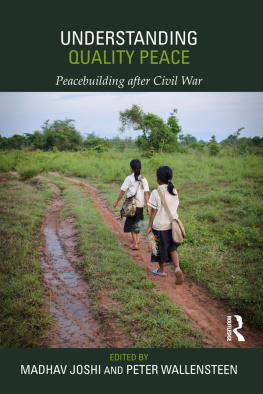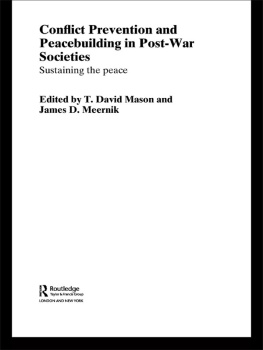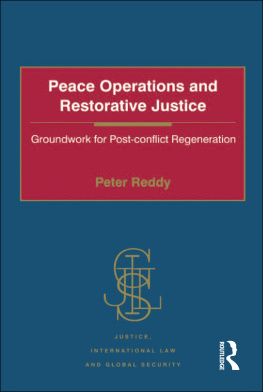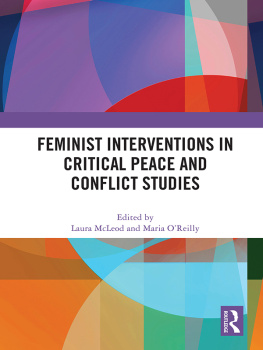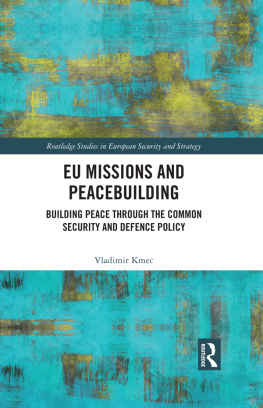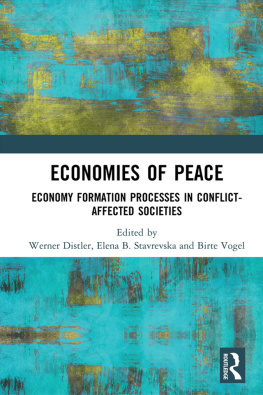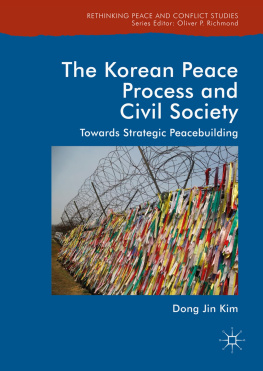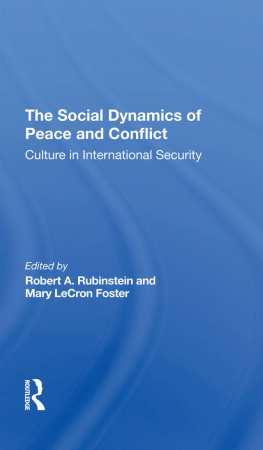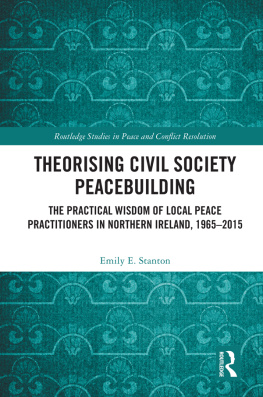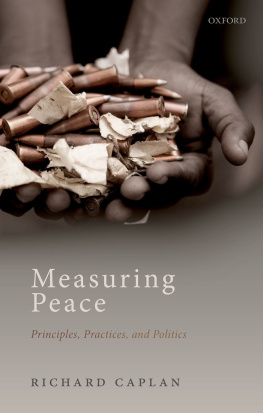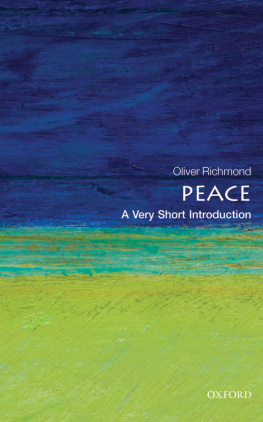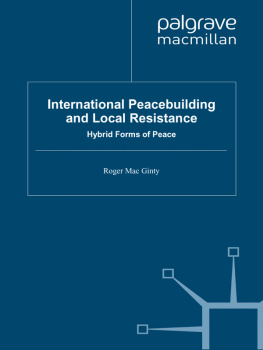First published 2018
by Routledge
2 Park Square, Milton Park, Abingdon, Oxon OX14 4RN
and by Routledge
711 Third Avenue, New York, NY 10017
Routledge is an imprint of the Taylor & Francis Group, an informa business
2018 selection and editorial material, Madhav Joshi and Peter Wallensteen; individual chapters, the contributors
The right of the editor to be identified as the author of the editorial material, and of the authors for their individual chapters, has been asserted in accordance with sections 77 and 78 of the Copyright, Designs and Patents Act 1988.
All rights reserved. No part of this book may be reprinted or reproduced or utilised in any form or by any electronic, mechanical, or other means, now known or hereafter invented, including photocopying and recording, or in any information storage or retrieval system, without permission in writing from the publishers.
Trademark notice: Product or corporate names may be trademarks or registered trademarks, and are used only for identification and explanation without intent to infringe.
British Library Cataloguing-in-Publication Data
A catalogue record for this book is available from the British Library
Library of Congress Cataloging-in-Publication Data
Names: Joshi, Madhav, editor. | Wallensteen, Peter, 1945 editor.
Title: Understanding quality peace : peacebuilding after civil war /
edited by Madhav Joshi and Peter Wallensteen.
Description: Abingdon, Oxon ; New York, NY : Routledge, 2018. |
Series: Security and conflict management | Includes bibliographical
references and index.
Identifiers: LCCN 2017039627| ISBN 9781138307674 (hbk : alk. paper)
| ISBN 9781138307681 (pbk : alk. paper) | ISBN 9781315142470 (ebk)
Subjects: LCSH: Peace-building. | Transitional justice. | Truth
commissions. | Civil society. | Democratization. | Civil war.
Classification: LCC JZ5538 .U535 2018 | DDC 303.6/4dc23
LC record available at https://lccn.loc.gov/2017039627
ISBN: 978-1-138-30767-4 (hbk)
ISBN: 978-1-138-30768-1 (pbk)
ISBN: 978-1-315-14247-0 (ebk)
Typeset in Bembo and Stone Sans
by Florence Production Ltd, Stoodleigh, Devon, UK

Since the end of the Cold War peace processes, peace agreements, and peacebuilding have become central in ending wars and constructing lasting security. This can be witnessed in the number of peace agreements as well as the rise in mediators, civil society organizations (CSOs) engaged in peace work and the establishment of the Mediation Support Unit within the United Nations. These peacemaking efforts have led to the reversal in the mode of conflict terminations that negotiated outcomes now are more frequent than victories. In lights of new trends in conflict termination and roles for various actors in the peace process, the quality and quantity of research has made remarkable headway to identify conditions that constitute the key factors in sustaining durable peace. The current volume brings together scholars and practitioners at the forefront of these efforts to focus on the quality of the peace that follow the end of war. In this book and two accompanying volumes the notion of Quality Peace is presented and elaborated.
This initiative is the result of a collaboration formed at the Kroc Institute for International Peace Studies, University of Notre Dame, Indiana, USA. It began in 2006 when John Darby, Professor of Comparative Ethnic Conflict at the Kroc Institute, and Peter Wallensteen, Richard G. Starmann Sr. Research Professor of Peace Studies at the Kroc Institute and Dag Hammarskjld Professor of Peace and Conflict Research at Uppsala University in Sweden began to cooperate on the idea of systematically studying the implementation of peace agreements. John had started to develop a matrix for teaching purposes. It would potentially allow researchers and practitioners to compare the terms of peace agreements and whether these terms were implemented. With funding from the United States Institute of Peace, the Peace Accords Matrix (PAM) began collecting data and developed its own website. Peter was then the leader of the UCDP at Uppsala University, Uppsala, Sweden. In addition to containing detailed information on armed conflicts around the world, UCDP also had collected systematic information on peace agreements and there were obvious synergies between the projects. As the collaboration continued to grow, Erik Melander, Deputy Director of the UCDP, and Madhav Joshi, Associate Director of PAM, joined the team.
A central puzzle that the researchers considered was how to describe post-war periods that were conducive for lasting peace between former belligerents. The team settled for the term Quality Peace, by which it aimed to identify the specific conditions in the post-accord environment that were the most conducive to a durable peace that also met basic human values. The project received support from the National Science Foundation to elaborate the notion of quality peace and develop tools for measuring the quality of peace. The Kroc Institute also provided substantial financial support for this endeavor.
A workshop was convened at the Kroc Institute in November 2010 including leading scholars and experienced peace practitioners, who agreed to contribute to the development of the concept. At a follow-up conference in May 2012, 15 papers were presented. Five factors were identified that were explored through analysis and case studies of processes that had lasted more than a decade. These factors include post-war security, governance, economic reconstruction, reconciliation and transitional justice, and civil society. These contributions have now been converted into the book chapters of this volume, primarily edited by Madhav Joshi and Peter Wallensteen. The editors have added their own introductory remarks and final comments on the future of the concept of Quality Peace.
Apart from those mentioned above, our colleagues R. Scott Appleby, John Paul Lederach, Hal Culbertson, Robert Johansen, George Lopez, and David Cortright at the Kroc Institute for International Studies have provided important input to intellectual debate throughout this project. We are thankful for encouragements, constructive comments, and suggestions from anonymous reviewers that we found helpful in the manuscript revision processes. We are also thankful to Samuel J. Nicholas, Lucy Dunderdale, and Audrey Faber who provided excellent assistance during several rounds of revisions.
We dedicate this volume to our colleague John Darby who continued to follow the project and hoped to join the conference in May 2012, although his health was deteriorating. He finally had to decline, but sent the participants an encouraging message. He passed away just a month later. John insisted that the study of peace accords should be useful for both researchers and practitioners. Indeed, it is and PAM already has a role in ongoing peace processes. Also, many of the contributors to this volume come from the world of practice, adding important insights to the academic contributions.
Notre Dame/Uppsala
Madhav Joshi and Peter Wallensteen
The Editors
Dinorah Azpuru is Associate Professor of Political Science at Wichita State University in Kansas, USA.
David Backer is currently Associate Research Professor and Assistant Director of the Center for International Development and Conflict Management at the University of Maryland, USA.
Viva Ona Bartkus is Associate Professor of Management at the University of Notre Dame, USA.
Karen Brounus

